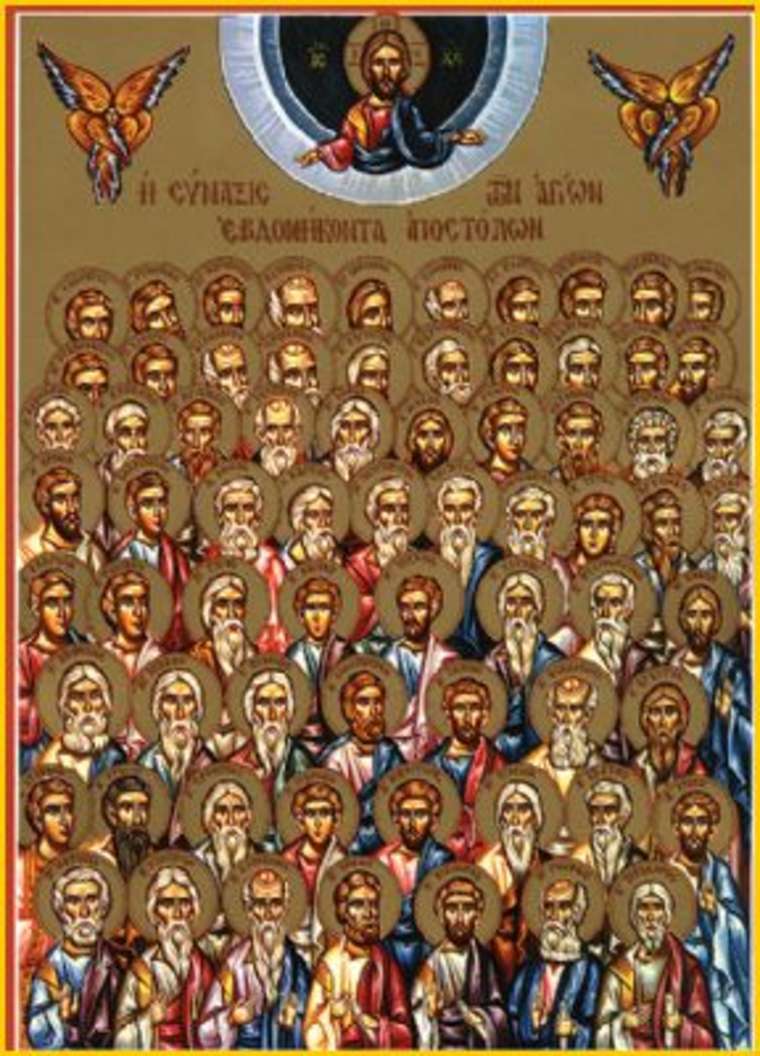Jesus Sends Out the Seventy-Two
Luke 10:1-12
After this the Lord appointed seventy-two others and sent them on ahead of him, two by two, into every town and place where he himself was about to go.2 And he said to them, “The harvest is plentiful, but the laborers are few. Therefore pray earnestly to the Lord of the harvest to send out laborers into his harvest. 3 Go your way; behold, I am sending you out as lambs in the midst of wolves. 4 Carry no moneybag, no knapsack, no sandals, and greet no one on the road. 5 Whatever house you enter, first say, ‘Peace be to this house!’ 6 And if a son of peace is there, your peace will rest upon him. But if not, it will return to you. 7 And remain in the same house, eating and drinking what they provide, for the laborer deserves his wages. Do not go from house to house. 8 Whenever you enter a town and they receive you, eat what is set before you. 9 Heal the sick in it and say to them, ‘The kingdom of God has come near to you.’ 10 But whenever you enter a town and they do not receive you, go into its streets and say, 11 ‘Even the dust of your town that clings to our feet we wipe off against you. Nevertheless know this, that the kingdom of God has come near.’ 12 I tell you, it will be more bearable on that day for Sodom than for that town.
Observations and Reflections
 After reading the title and text of Luke 10:1-12, one may have noticed that Jesus sent 72 disciples rather than 70. For long-time readers of the KJV, this might come as a shock. Normally, we could lookup the matching story in another gospel to check but Luke is the only gospel that records this particular story. Thus, we must explore historical texts to find a possible answer to the riddle.
After reading the title and text of Luke 10:1-12, one may have noticed that Jesus sent 72 disciples rather than 70. For long-time readers of the KJV, this might come as a shock. Normally, we could lookup the matching story in another gospel to check but Luke is the only gospel that records this particular story. Thus, we must explore historical texts to find a possible answer to the riddle.
As it turns out, the various Greek manuscripts which this verse appears, are divided on the matter. Some show 70 and some show 72. More specifically, the Sinaiticus and Caesarean traditions contain the 72 reading, while most other Alexandrian traditions contain 70. But the story does not end there. A number of early church texts mention either 70 and 72 depending on the tradition.
Some of the more common thoughts on the numbers 70 & 72, are that they signified important Jewish features, such as the 70 generations of Noah, or the 72 translators of the Septuagint (LXX). However, the Latin title “Septuagint” is a bit ironic since it means 70 in English. But tradition holds that there were 72 translators. Even more interesting, the Septuagint also lists the generations of Noah, in Genesis 10, but in the Septuagint’s translation there are 72 generations, not 70. It is this connection with the generations of Noah that is likely the key to understanding the point of the passage. Luke (Jesus) is indicating that the disciples are going to all the nations of the world, all 70/72. It was believed that these 70/72 generations make up all the people’s of the world. An ancient Jew or Hebrew could refer to the 70 or 72 nations and it would have been understood that they were referring to all the nations of the world, as described by Genesis 10.
Thus, it would be safe to say that the manuscript traditions that relied heavily upon the LXX would have likely used 72 for Luke 10, while those who relied on the MT would have likely sided with 70, such as the TR and the Vulgate.
 The ministry of Jesus Christ is now being expanded to more then just the twelve disciples. Jesus is looking for hearts who are both equipped and desire to go out and spread the good news of the Gospel to the world.
The ministry of Jesus Christ is now being expanded to more then just the twelve disciples. Jesus is looking for hearts who are both equipped and desire to go out and spread the good news of the Gospel to the world.
Jesus also gives specific instructions on how to approach those who are not believers because preaching the Gospel can be a very delicate and daunting task. However, He gives them an outline of exactly what to do and furthermore that He is sending them out with His power and strength with them.
The beautiful part about this passage is that God knows exactly what we need and what we will face when going out to preach the Gospel. He well equips us for it and never leaves us without the proper tools. He gave these seventy two men the right words, responses and actions. This is a God who never overlooks details and there is no stone left unturned. He directs, leads and guides us and He does not miss a mark when He is instructing the disciples.
Each of us as Christians should always have a desire to share the Gospel with those around us. Take the time to think about any one in your life that needs reaching out too and begin to pray that God will properly equip you. It doesn’t even have to me an official conversation. Sometimes just the way we live, act and speak is enough for God to use to draw attention to why we are different. God knows our needs and skills and if we are willing, He is able to use us.
